Executive Dysfunction and ADHD: Society's View and the the Real Invisible Battle of Daily Life
- Tez Frost
- Feb 23, 2025
- 9 min read
Updated: Feb 25, 2025

One of the most challenging aspects of explaining ADHD is executive dysfunction: the difficulty in planning, organising, remembering, and completing tasks. These are skills many people take for granted, as daily life naturally requires organisation, whether it’s cooking a meal, commuting to work, or simply remembering to unload the washing machine when it’s done.
To those unfamiliar with ADHD, executive dysfunction can seem baffling, even like laziness. For undiagnosed ADHDers, these misconceptions can be internalised, leading to self-blame and endless frustration as they struggle to "sort their lives out."
But executive dysfunction in ADHD isn’t an excuse—it’s a neurological challenge that makes organising, starting, and following through on tasks significantly harder. It’s not about a lack of effort or responsibility but rather a disconnect between intention and action; an essential function that many rely on without thinking.
While everyone faces difficulties with organisation at times, ADHD fundamentally alters the brain’s ability to regulate motivation, focus, and task management. Recognising this isn’t about lowering expectations but about creating strategies and support systems that help ADHDers navigate life, rather than expecting them to simply "try harder."
My Family

ADHD has had a significant impact on my life—particularly within my family. My wife was diagnosed with autism several years ago, followed by ADHD, which may now fall under the emerging term AuDHD. With my own neurodivergence of autism, I applied my autistic hyperfocus to deep dive into books, talks, articles, and countless YouTube videos to better understand ADHD.
What I learnt sheds light on many of her experiences—someone incredibly talented in her career yet struggling with many everyday activities, for example:
Items left out after cleaning.
Wet clothes forgotten in the washing machine.
Clean clothes stacked neatly beside the wardrobe but never put away: "the floordrobe."
Countless hobbies started with enthusiasm—some never finished, others never even begun.
Leaving cars key near the front door. We have had two car stolen through a magnetic fishing pole method through the letterbox!
Half-drunk cups and glasses all around the house.
Forgotten overdue library books and a million unread bought books. It's often noted that the hobby of reading is a different to the hobby of collecting books!
"Have you seen my <insert object>?" Could be mobile phone, hairbrush, keys etc.
Arriving incredibly early somewhere in an attempt not to be late.
Perhaps not an autism vs ADHD direct comparison but I do like the quote:

What does Science say?
Executive functioning (EF) refers to a set of cognitive processes controlled by the prefrontal cortex and thalamic-reticular areas of the brain, responsible for regulating thoughts, emotions, and behaviors to achieve goals. Research[1.] highlights EF deficits as a core aspect of ADHD, affecting both:
Neuropsychological performance – Inhibition (impulse control), working memory (holding and manipulating information), attention-vigilance (sustaining focus), and set-shifting (flexibility in thinking).
Behavioural skills – Time management, self-organization, self-motivation, and self-activation.
The severity of EF impairments plays a significant role in whether ADHD symptoms persist into adulthood (ADHD-P) or remit (ADHD-R), with around 50% of individuals continuing to experience symptoms in adulthood[2.]. Studies show that those with ADHD-P tend to have more pronounced deficits in executive functioning compared to those with ADHD-R.
Even in cases where ADHD symptoms remit, executive function challenges often persist, though to a lesser degree. Individuals may continue to experience difficulties with self-organization, impulse control, and task initiation.
Although executive dysfunction is often seen as a disadvantage, one study links it to ADHD hyperfocus, exploring the neurocognitive mechanisms behind this connection. Findings suggest that university students with more severe ADHD symptoms and greater EF difficulties experience hyperfocus more frequently, particularly reward-related hyperfocus. EF difficulties were found to partially mediate the relationship between ADHD and hyperfocus, accounting for about one-quarter of the effect. However, they did not explain the link between ADHD and reward-related hyperfocus, suggesting that other factors—such as reward sensitivity and dopamine regulation—may also play a key role in why ADHDers experience hyperfocus.
In terms of reward sensitivity, further research[3.] indicates that ADHDers often struggle with detecting or predicting rewards, which directly influences attention and motivation. This difficulty may lead to hyperfocus as a response to perceived or anticipated rewards. Additionally, neurological studies highlight the interaction between cognitive control regions (such as the dorsolateral prefrontal cortex) and reward-processing areas (like the orbitofrontal cortex and nucleus accumbens). This suggests that hyperfocus may emerge from an imbalance between cognitive regulation and reward-driven arousal, where the ADHD brain seeks dopamine boosts from hyperfixated tasks over those that lack immediate feedback (e.g., paperwork, chores).
The study further highlights that hyperfocus can also serve as a coping mechanism, particularly in response to delayed rewards. The tendency to engage deeply in stimulating tasks may help bypass the frustration of waiting for less immediate reinforcement.
While executive dysfunction contributes to difficulties with task initiation and persistence, heightened reward sensitivity may override these challenges in specific contexts, leading to intense periods of hyperfocus and achievement. Understanding this relationship can help reframe hyperfocus as both a strength and a challenge, providing insight into how ADHDers can better harness their abilities for productivity and personal growth.
The Emotional Toll of Executive Dysfunction
Many research papers and self-help websites[4.] make a clear link between ADHD and anxiety with around 50% of ADHDers having one or more cooccurring anxiety conditions[5.]; often with anxiety a precursor diagnosis before formally receiving the ADHD diagnosis—it some times feels that people's world need to fall part before receiving the help needed. I look forward to a future world where identifying a neurodivergent starts from a positive place rather than he struggles. One question that led me to write this article is how much does executive dysfunction play a part in anxiety comparative to other ADHD traits?
Let's consider some aspects of ADHD executive dysfunction that could contribute to anxiety:
Task Overload: Difficulty prioritising, forgetting deadlines, and procrastination lead to last-minute panic and stress.
Emotional Dysregulation: Small frustrations escalate into intense anxiety; difficulty shifting focus causes rumination.
Working Memory Issues: Forgetting details, losing track of thoughts, and making mistakes increase self-doubt.
Social Anxiety: Blurting out thoughts, missing social cues, and overanalysing interactions create fear of judgment.
Time Blindness: Chronic lateness, underestimating task duration, and struggling with transitions cause daily stress.
Financial Struggles & ADHD Tax: Impulse spending, late fees, forgotten subscriptions, and difficulty budgeting lead to financial anxiety. A key phrase often used is object permeance e.g. out of sight, out of mind; for example forgetting to cancel a streaming service after the free period or excessive spending on a new hobby before losing interest two weeks later.
A study[6.] examined the relationship between ADHD traits such as hyperactivity, inattentiveness and executive dysfunction and anxiety in adolescents with ADHD symptoms. The findings revealed that inattention symptoms are a stronger predictor of anxiety than hyperactivity but is executive dysfunction that played the most significant predictors of anxiety, particularly in areas related to emotional regulation, cognitive flexibility, and metacognitive skills like working memory and planning.
It's worth noting the study also mentions that self-reports from the adolescents showed a stronger link between ADHD and anxiety than parent reports, likely due to the internalised nature of anxiety.
Strategies for Managing Executive Dysfunction

There is no shortage of advice on the internet for ADHDers looking to manage daily life. In fact, it seems that ADHD coaching and advice websites are far more common than autism-specific ones. This may be because ADHD symptoms are more action-driven and respond well to structured interventions like time management, habit formation, and productivity strategies. ADHD also has a stronger self-help industry, appealing to late-diagnosed adults seeking practical solutions. In contrast, autism coaching tends to focus on identity, sensory needs, and self-advocacy rather than productivity hacks.
I've read many books and seen my wife respond well to particular strategies, listed below are the a few I feel are the most effective:
ADHD Coaching: Professional guidance, giving understanding how an ADHD brain works, the impact on your life and then how to adapt by developing personalised strategies for productivity, focus, and self-regulation.
Body Doubling: Working alongside someone (in-person or virtually) to improve focus and accountability—sometimes just being in the same room can help an ADHDer complete the task. It's worth reading the books for more detail on body doubling: Dirty Laundry[7.] and Small Talk[8.] by Rich and Rox who host @ADHD_Love_ Instagram channel with over a million followers.
Whiteboards in Every Room: Visual cues to keep track of tasks, deadlines, and important reminders. An idea from Alex Partridge's book: Now It All Makes Sense[9.], basically his solution to object permeance to always have a whiteboard or notebook available to him to consult or capture important tasks.
Idea Buddy System:When a new idea arises, discuss it with a trusted person and wait two weeks before making a decision to avoid impulsive choices. Another idea from Alex Partridge that resonated in my life. Alex formed the highly successful Facebook page UNILAD, but before this he launched endless other businesses with little consideration for their potential or even if he'd maintain an interest. Nowadays rather than react he will discuss the idea first with a Buddy and revisit it two weeks later.
ADHD Planner: A structured planner designed for ADHD-friendly organisation, with task prioritisation and reminders. See bonus section for access to my own free resources to download and print or the option to buy through Amazon.
Conclusion
Understanding ADHD, and its relationship with executive dysfunction, is key to shifting the narrative from society's misconceptions of laziness to recognition of real neurological challenges. While executive dysfunction can create significant obstacles in daily life that affecting work, relationships, and emotional well-being, it is also deeply intertwined with benefits that hyperfocus can bring a feeling of reward and when understood earlier can help with some of the issues of anxiety.
However, awareness alone isn’t enough. Practical strategies, from ADHD coaching and body doubling to structured planners and external reminders, can help individuals manage executive dysfunction more effectively. The goal isn’t to “fix” ADHD but to create environments and systems that support neurodivergent minds in ways that work for them.
Looking forward, the hope is for a world where neurodivergence is recognised early and supported proactively, rather than only addressed when struggles reach a breaking point. By fostering understanding and embracing tailored strategies, we can help ADHDers not just manage life, but thrive in it.
Bonus Section: Neurodivergent Planner
Working with my wife we developed a daily planner that could help her managed her life in a more systematic and easier way developing what we called The Neurodivergent Focus: Daily Planner. Here is the summary:
Unlock Your Potential with the Neurodivergent Focus: Daily Planner
Designed for neurodivergent individuals, this daily planner is your companion for staying organized, mindful, and balanced in everyday life. Whether you’re managing ADHD, autism, or another form of neurodiversity, this planner offers a flexible, user-friendly structure that supports your unique needs.
With dedicated sections for setting goals, tracking your mood, managing tasks, and reflecting on moments of gratitude, this planner encourages a holistic approach to productivity and self-care. From tracking your water intake to monitoring your energy levels, every aspect of your day is covered to help you thrive.
Inside, you'll find 100 daily planner sheets, 2 page must-do tracker, 4 page distraction tracker and a 5 page mood tracker:
Positive affirmations and goals to set the tone for your day
Practical trackers for mood, energy, personal hygiene, and daily habits
Space for creative doodling and free-form thoughts
Reminders to prioritise self-care, finances, and exercise
Longer term must-do tracker for tasks bigger than daily activity
Whether you're striving to meet deadlines, focus on personal growth, or simply manage your day with more ease, this planner will guide you to stay on track and connect with yourself in meaningful ways.
Take control of your day. Track your progress. Celebrate your wins—big and small.
Downloads (for personal use only)
Reference
Roselló B, Berenguer C, Baixauli I, Mira Á, Martinez-Raga J, Miranda A. Empirical examination of executive functioning, ADHD associated behaviors, and functional impairments in adults with persistent ADHD, remittent ADHD, and without ADHD. BMC Psychiatry. 2020 Mar 24;20(1):134. doi: 10.1186/s12888-020-02542-y. PMID: 32204708; PMCID: PMC7092442.
Sibley MH, Arnold LE, Swanson JM, Hechtman LT, Kennedy TM, Owens E, Molina BSG, Jensen PS, Hinshaw SP, Roy A, Chronis-Tuscano A, Newcorn JH, Rohde LA; MTA Cooperative Group. Variable Patterns of Remission From ADHD in the Multimodal Treatment Study of ADHD. Am J Psychiatry. 2022 Feb;179(2):142-151. doi: 10.1176/appi.ajp.2021.21010032. Epub 2021 Aug 13. PMID: 34384227; PMCID: PMC8810708.
Swan, Angela. The Adult Hyperfocus and Motivation Scale: A Pilot Study. Alliant International University ProQuest Dissertations & Theses, 2021. 28542429.
van der Meer D, Hoekstra PJ, van Rooij D, Winkler AM, van Ewijk H, Heslenfeld DJ, Oosterlaan J, Faraone SV, Franke B, Buitelaar JK, Hartman CA. Anxiety modulates the relation between attention-deficit/hyperactivity disorder severity and working memory-related brain activity. World J Biol Psychiatry. 2018 Sep;19(6):450-460. doi: 10.1080/15622975.2017.1287952. Epub 2017 Mar 1. PMID: 28635543; PMCID: PMC5581282.
Haugan AJ, Sund AM, Thomsen PH, Lydersen S, Nøvik TS. Executive functions mediate the association between ADHD symptoms and anxiety in a clinical adolescent population. Front Psychiatry. 2022 Sep 12;13:834356. doi: 10.3389/fpsyt.2022.834356. PMID: 36172514; PMCID: PMC9510657.
Richard Pink, Roxanne Pink. Dirty Laundry: Why adults with ADHD are so ashamed and what we can do to help. Square Peg. 2023.
Richard Pink, Roxanne Pink. SMALL TALK: 10 ADHD lies and how to stop believing them. Square Peg. 2024.
Alex Partridge. Now It All Makes Sense: How An ADHD Diagnosis Brought Clarity to My Life. Sheldon Press. 2025.







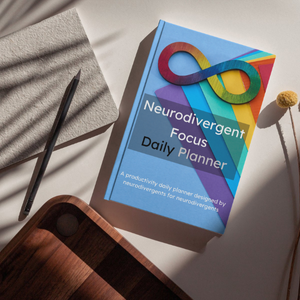

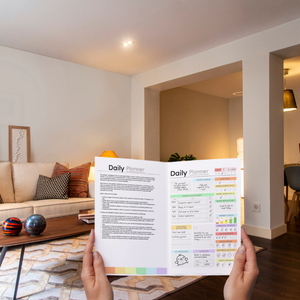

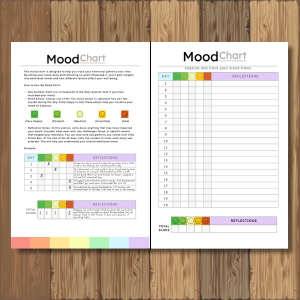



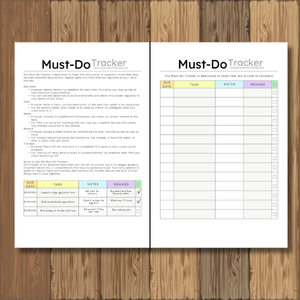

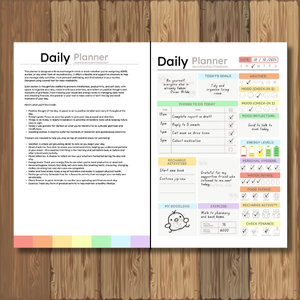






Comments